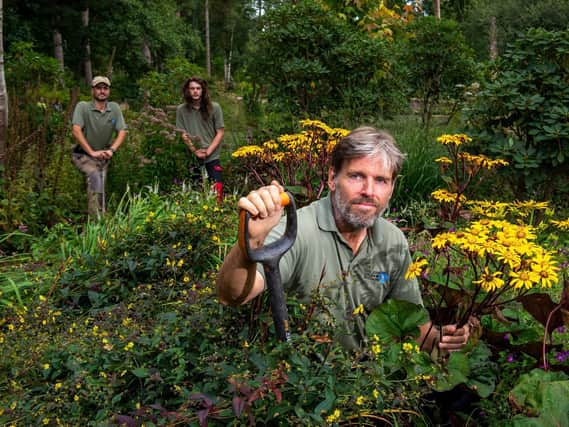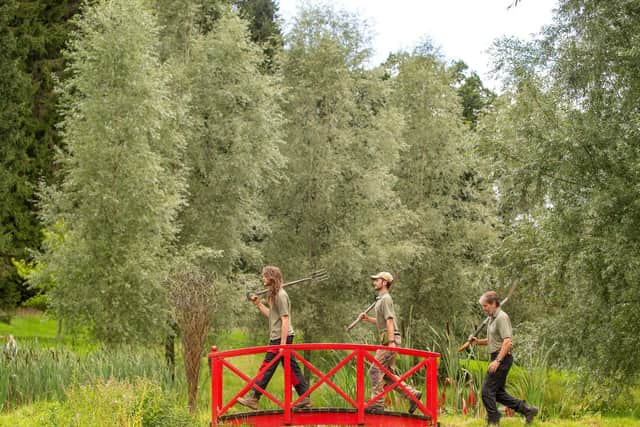The head gardener at Yorkshire's Himalayan Gardens wants to give people a new start in nature after experiencing redundancies


Meet Mr Motivator crossed with a dash of Indiana Jones and Monty Don.
Stephen Ward, the new Head Gardener at Yorkshire’s Himalayan Gardens and Sculpture Park near Ripon has only been in post six months, but he has powerful ambition to create a 40-strong team of ‘Himalayan Rangers’. “There are four of us working in the gardens,” he says. “I aim to grow that to a thriving community of volunteers.”
Advertisement
Hide AdAdvertisement
Hide AdThe Himalayan Rangers will be able to do a variety of work from giving guided tours to doing flower or insect surveys and helping with the nursery and the annual garden maintenance plan. Stephen’s own personal story has shaped the initiative.


“My life has suffered redundancies and the trials and tribulations I have been through a lot of people will be going through at this moment in time with the economic fall-out of Covid-19. I want to help those people by providing a place for them to come that will help them to move on to something better. It’s the same situation I’ve been in. People have helped me in the past and it’s my chance now to help. For anybody suffering the anxieties of redundancy or losing their job, this can be a life changing moment, like it was for me.”
Growing up in a small isolated village near Scunthorpe, his family emigrated to Australia when he was a young child. He returned to England in his final school year. “I wasn’t the cleverest person in school and was led to believe that I’d amount to nothing in life. I wanted to prove them wrong.
“I didn’t have the tools as a child, but one thing I had was football. I trained really hard and I played for Doncaster Boys and Scunthorpe United Reserves. I played with Alan Clarke – a legend at the time. A lot of good things came out of football for me.”
Advertisement
Hide AdAdvertisement
Hide AdHe later realised he was Dyslexic. Stephen went on to get a first-class degree in archaeology later in life, as well as become the author of the Togger children’s books about football, telling stories on overcoming bullying, how to deal with impossible situations or losing in a game. He gives motivational talks to schools, hoping to reach the one or two boys who may be struggling as he did.
Australia had a positive impact on his outlook to life. “As a child in an isolated English village to go the golden beaches of Australia, it was like a wonderland. All the wildlife really opened my eyes to the world. I saw this massive world.”
Back in England, he began a career as an agricultural engineer before being made redundant. Unable to find work in engineering, he took qualifications in football coaching, weight training and lifeguarding, working his way up from fitness instructor to senior manager.
Redundancy hit again and Stephen used his redundancy money to retrain in archaeology, working on sites around the world. In 2008, the recession hit and all archaeological contracts dried up.
Advertisement
Hide AdAdvertisement
Hide Ad“I’m only human and each redundancy had its own problem. One minute you’re leading this normal life, and the next everything has disappeared. The finances that enabled you to do things you normally did are not there anymore, then there’s the worry of the bills. On top of that, you ask, where am I going? What am I doing? The job characterises who you are and everything has just gone.”
Feeling despondent, Stephen went to the job centre for the first time in his life and they suggested a six-week horticulture course. “The next thing you know I’m working for English Heritage. I’m quite a tenacious person. Even though it was getting me down and things seemed impossible, I just thought I’m going to do this.
“You live in hope, you get out there – you find things on the internet, courses to do, places to volunteer – you get experience behind you and the next thing you know you’re getting paid for it and are back on track again. Once you’re back on track, you improve your knowledge. And your work ethic is right – you turn up for work every day and you do your job, and the next thing, you’re promoted. I know I can fall back into redundancy again or I can be heading the show, and I know which direction I want to be in.”
Stephen feels his never give up attitude can help others facing redundancy and he’s seen it work first-hand. Prior to the Himalayan Gardens, his previous role was grounds manager at Middleton Hall in Warwickshire, set in 42 acres.
Advertisement
Hide AdAdvertisement
Hide Ad“When I got there, there were only three gardeners part-time. I expanded the team to 45 people – mainly volunteers. Each person had a different thing to do according to their abilities. The more robust guys tended to do the tree work and clearing vegetation, others worked in the greenhouse potting up or taking care of the flowers in the walled gardens, and others liked doing guided tours or helping visitors – everything from first aid to moth surveys – they came in with no background whatsoever.
“Everyone was treated with the same respect as full-time workers. They were valued for everything they did, even if they thought it was trivial. There was one guy who emptied the dustbins, and he loved that job and he was part of the jigsaw puzzle – everyone’s doing different things, part of a team, that builds a bigger picture.”
Stephen believes in the Natural Health Service - the idea that the natural environment can improve the health and wellbeing. “An aspect I looked at was the volunteers’ mental health. Many who had retired or were being made redundant found there wasn’t purpose in life.
“Like Covid-19 today, that affected their mental well-being. Working with me in the gardens in just a few weeks you could see the difference in them. It lifted them, it gave their confidence back, because you’re learning new things, new skills in a wonderful environment. I had many people saying it changed their lives.
Advertisement
Hide AdAdvertisement
Hide Ad“You can see the spark in their eyes, the colour in their cheeks,” he adds. “When they first arrive, they’re quite abrupt because they’re suffering, they want quiet little corners. Three weeks later you can hear the laughter in the place and people genuinely enjoying themselves and I can think yes, I’ve made a change.”
No gardening knowledge or experience is needed to join the Himalayan Rangers. Stephen says volunteers can shape activities in the gardens depending on their skills.
“If people express an interest, I’ll contact them for a site visit, I’ll give them a guided tour, talk to them about the diversity of jobs we do. It’s not just weeding or pruning, there’s many things. If they have a skill, it could even be photography, then I can see how we can use that. I’m a motivational person, I hope to inspire people. Volunteers often talk to me about their anxieties, about various things in life, and I get them on track and talk to them about things they can achieve.”
The garden attraction was donated in 2012 to a Charitable Trust, The Hutts Foundation, by Peter and Caroline Roberts. It aims to advance the arts, horticulture and the environment, including the cultivation of rare and endangered plants in the fertile microclimate of the valley.
Advertisement
Hide AdAdvertisement
Hide AdThe 45 acres of woodland and garden with three lakes and an arboretum feature over 1,400 varieties of rhododendron and more than 80 striking contemporary sculptures in the landscape.
The grounds feature a Pagoda, summerhouse, Norse Hut, and Himalayan Shelter. Winners of the Yorkshire in Bloom Tourist Attraction Award in 2018 and 2019, they were also shortlisted for the BBC Countryfile 2020 Garden of the Year.
Details on how to become a volunteer will be posted this month at www.himalayangarden.com
Support The Yorkshire Post and become a subscriber today.
Your subscription will help us to continue to bring quality news to the people of Yorkshire. In return, you'll see fewer ads on site, get free access to our app and receive exclusive members-only offers.
Advertisement
Hide AdAdvertisement
Hide AdSo, please - if you can - pay for our work. Just £5 per month is the starting point. If you think that which we are trying to achieve is worth more, you can pay us what you think we are worth. By doing so, you will be investing in something that is becoming increasingly rare. Independent journalism that cares less about right and left and more about right and wrong. Journalism you can trust.
Thank you
James Mitchinson